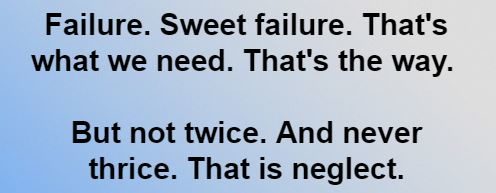MISSION ACCOMPLISHED!
When you have accomplished your mission you know you are paying attention to risk!
Do not be afraid to fail, that is what training is about. Its actually required unless you already know the content.
But for the first time learner an effective instructor will translate to the student the best measures to approach the problem with credible solutions.
The mission is delivered when there are no mishaps, the operations are based on technical boating, proper PPE is assigned, and training is documented along with the program needs. If this is not taking place, stop and restart the program before a mishap occurs.
Successful mission outcomes are great, but it comes with a heft investment of time, personnel and funding.
Updates cannot happen within an agency, they must come from those who are in the field and discovering content, creating content, testing the content, measuring the content and delivering the content. This is what qualified instructors bring to an agency versus a 'train the trainer' format that weakens the foundation strength.
It's been proven that intellectual knowledge is delivered from subject matter experts. Most training programs do not maintain or reach their potential due to downsizing the curriculum to save time. Those agencies should not have a Rescue Water Craft marine unit. Maintaining a boat unit is an expansive responsibility.
Oftentimes agencies treat the Rescue Water Craft program as a rescue asset instead of a boat asset. The two are in conflict with on another. Boating must come first, rescue is the final application.
Students must want to learn and content must be updated annually for this to happen.

How do you rank?
Your must evaluate your training program. You need a baseline measure to compare the success from failure.
Ask yourself these questions:
1. Do you have the proper fitted and sized PPE?
2. Do you evaluate physical fitness levels and how often?
3. Are your checklists signed off by the individual who tasks the assignment?
4. Are your RWC's pulled out of service when there is questionable operational behaviors?
5. Are your rescue boards inspected?
6. Trailer inspection list, how often?
7. Weather and water conditions listed in training logs?
8. Individual training logs and results maintained.
9. Equipment is retired according to use and wear and manufacturer recommendations.
10. Is your team certification current and valid for 3 years?
11. Do you review your curriculum annually?
12. Has each team member read the manufacturers Owners Manual?
13. Does each team member hold a current valid Boat operators license or permit?
14. Do your team members know how to swim in the water you train in?
1 to 4 - AT RISK
5 to 8 - NEEDS IMPROVEMENT
9 to 12 - SECURE

Rescue Board Training and Inspection
CORRECTIONS
Any of the questions above that were not checked are the ones you need to focus on.
You can revise your program internally or hire a subject matter consultant. We can help you with that.
We have created hundreds of solutions for clients who knew their program was at risk. It's easy to correct. Don't let your program suffer or open up bigger problems down the line. Consider making your own program evaluation and presenting it to your
administration for review. Then tackle those concerns head on.
It's better to effect change before problems occur rather than when a mishap occurs. They can be costly in resource loss, out of service and injury recovery time due to loss of work for individuals.
Thank you for taking the short quiz and for caring about your Marine Unit.
Remember this: A moment for safety can save a lifetime of regret.
_______________________________
Have any questions? Join the Rescue Water Craft Association
and discover what your community is doing to modernize standards, safety and reduce liability!
Join the Rescue Water Craft Association
Content Creator: Shawn Alladio cares most about her community and the culture surrounding the safety of event service providers and Rescue Water Craft operators, working hard and dedicated towards protecting their reputation, distributing safety information and continuing to train these amazing individuals to the highest standards of care.
Use at your own risk. Please take a qualified Rescue Water Craft training course and maintain proper records and respect all the PWC, RWC, PPE, and gear OEM manufacturer warning labels and cautions.
